Intro
Discover good sources of potassium, including potassium-rich foods like bananas, avocados, and spinach, to boost heart health and reduce blood pressure naturally with essential electrolytes and minerals.
Potassium is an essential mineral that plays a crucial role in maintaining various bodily functions, including heart health, blood pressure, and muscle function. It is a vital component of a balanced diet, and its deficiency can lead to several health problems. With the importance of potassium in mind, it is essential to identify good sources of this mineral to ensure adequate intake.
A well-balanced diet that includes a variety of whole foods can provide sufficient potassium. Fresh fruits, vegetables, whole grains, and lean proteins are all excellent sources of potassium. Some of the richest sources of potassium include leafy green vegetables, such as spinach and kale, as well as fruits like bananas and avocados. Nuts and seeds, like almonds and pumpkin seeds, are also good sources of potassium.
In addition to these food sources, there are several other ways to increase potassium intake. Potassium supplements are available, but it is always best to consult with a healthcare professional before taking any supplements. Furthermore, many foods are fortified with potassium, making it easier to get enough of this essential mineral. By understanding the importance of potassium and incorporating potassium-rich foods into your diet, you can maintain optimal health and reduce the risk of potassium deficiency.
Benefits Of Potassium
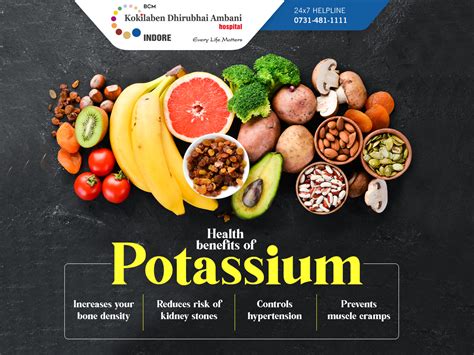
A diet rich in potassium can also help reduce the risk of kidney stones and osteoporosis. Potassium helps regulate fluid balance in the body, which can help prevent the formation of kidney stones. Furthermore, potassium helps maintain bone density, reducing the risk of osteoporosis and fractures. With its numerous health benefits, it is essential to prioritize potassium intake and make it a vital component of your diet.
Food Sources Of Potassium
Potassium is found in a variety of foods, making it easy to incorporate into your diet. Some of the richest sources of potassium include: * Leafy green vegetables, such as spinach and kale * Fresh fruits, like bananas and avocados * Nuts and seeds, such as almonds and pumpkin seeds * Whole grains, like brown rice and quinoa * Lean proteins, such as chicken and fishThese foods are not only rich in potassium but also provide other essential nutrients, making them a great addition to a balanced diet. By including a variety of these foods in your diet, you can ensure adequate potassium intake and maintain optimal health.
Importance Of Potassium
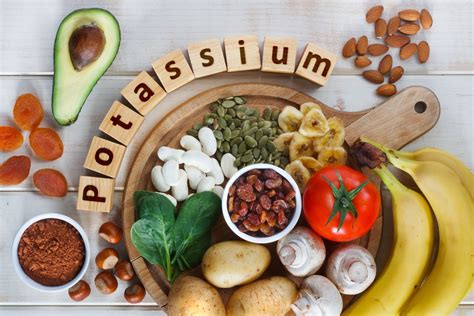
Potassium also plays a crucial role in maintaining healthy muscles. Potassium helps regulate muscle contractions, reducing the risk of muscle cramps and weakness. Furthermore, potassium helps maintain healthy nerves, reducing the risk of nerve damage and disorders. With its numerous functions, potassium is an essential mineral that should not be overlooked.
Potassium Deficiency
A potassium deficiency can lead to several health problems, including muscle weakness, fatigue, and heart arrhythmias. A deficiency in potassium can occur due to various factors, including a poor diet, certain medications, and underlying medical conditions. Symptoms of a potassium deficiency may include: * Muscle weakness and cramps * Fatigue and weakness * Heart arrhythmias and palpitations * Constipation and abdominal crampsIf you suspect a potassium deficiency, it is essential to consult with a healthcare professional. They can help diagnose the deficiency and recommend the best course of treatment. In most cases, a potassium deficiency can be treated with dietary changes and supplements.
Potassium Rich Foods
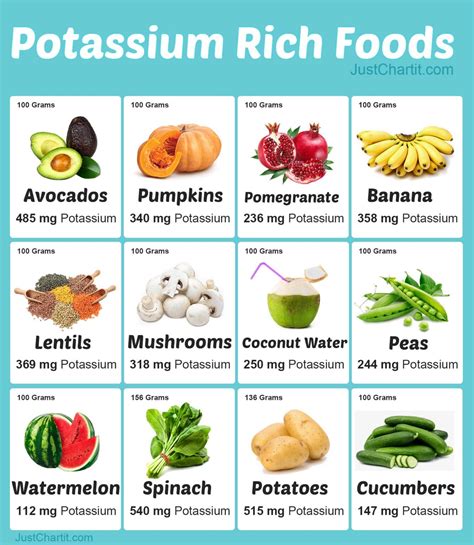
These foods are not only rich in potassium but also provide other essential nutrients, making them a great addition to a balanced diet. By including a variety of these foods in your diet, you can ensure adequate potassium intake and maintain optimal health.
Cooking And Potassium
Cooking can affect the potassium content of foods, making it essential to cook foods in a way that preserves their potassium content. Some cooking methods, such as boiling, can lead to a loss of potassium, while others, such as steaming, can help preserve it. To maximize the potassium content of foods, it is recommended to: * Steam or sauté foods instead of boiling them * Use minimal water when cooking * Avoid overcooking foodsBy following these tips, you can help preserve the potassium content of foods and ensure adequate potassium intake.
Potassium Supplements
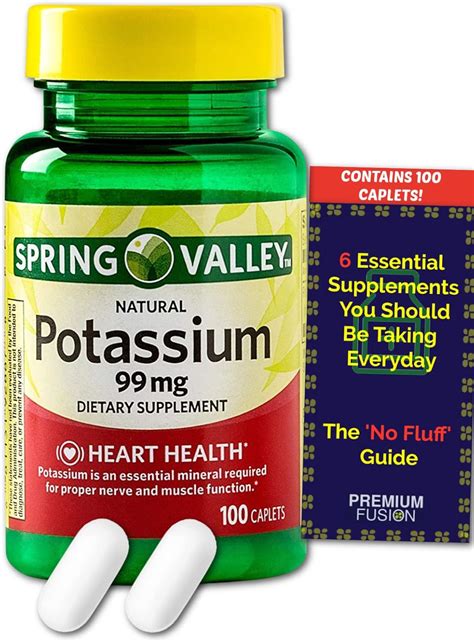
Potassium supplements come in various forms, including tablets, capsules, and powders. They can be taken with or without food, depending on the type of supplement. It is essential to follow the recommended dosage and consult with a healthcare professional if you experience any side effects.
Potassium And Other Nutrients
Potassium interacts with other nutrients, making it essential to maintain a balanced diet. Potassium can interact with sodium, calcium, and magnesium, among other nutrients. A diet that is rich in potassium and other essential nutrients can help maintain optimal health.Some of the key nutrients that interact with potassium include:
- Sodium: Potassium can help counteract the effects of sodium, reducing blood pressure and the risk of cardiovascular disease.
- Calcium: Potassium can help regulate calcium levels, reducing the risk of kidney stones and osteoporosis.
- Magnesium: Potassium and magnesium work together to maintain healthy muscles and nerves.
By understanding how potassium interacts with other nutrients, you can make informed decisions about your diet and maintain optimal health.
Potassium And Health
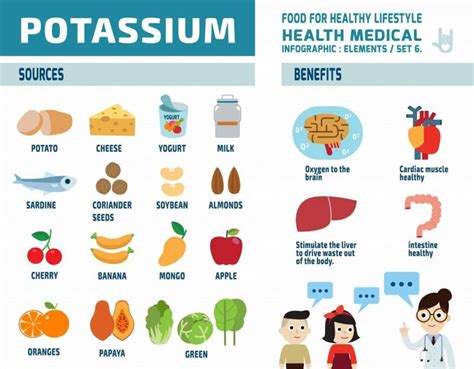
Some of the key health benefits of potassium include:
- Reduced risk of cardiovascular disease
- Lower blood pressure
- Reduced risk of kidney stones and osteoporosis
- Healthy muscles and nerves
By prioritizing potassium intake and maintaining a balanced diet, you can reduce the risk of various health problems and maintain optimal health.
Potassium And Disease Prevention
Potassium can help prevent various diseases, including cardiovascular disease, kidney stones, and osteoporosis. A diet rich in potassium can help reduce the risk of these diseases by: * Lowering blood pressure * Reducing the risk of kidney stones * Maintaining healthy bones * Regulating blood sugar levelsBy incorporating potassium-rich foods into your diet, you can reduce the risk of various diseases and maintain optimal health.
Potassium Intake
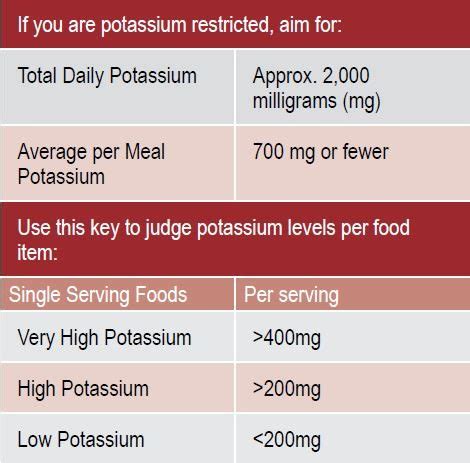
It is essential to consult with a healthcare professional to determine the best course of treatment and recommended daily intake of potassium.
Potassium And Age
Potassium needs vary based on age, making it essential to understand the recommended daily intake for your age group. The recommended daily intake of potassium for different age groups is: * Infants: 400-700 milligrams per day * Children: 1,000-2,000 milligrams per day * Adolescents: 2,300-3,000 milligrams per day * Adults: 4,700 milligrams per dayBy understanding the recommended daily intake of potassium for your age group, you can make informed decisions about your diet and maintain optimal health.
Potassium And Sex

By understanding the recommended daily intake of potassium for your sex, you can make informed decisions about your diet and maintain optimal health.
Potassium And Pregnancy
Potassium is essential during pregnancy, as it helps support the growth and development of the fetus. A diet rich in potassium can help reduce the risk of pregnancy complications, such as preeclampsia and gestational diabetes.Some of the key benefits of potassium during pregnancy include:
- Reduced risk of preeclampsia
- Reduced risk of gestational diabetes
- Healthy fetal development
- Reduced risk of pregnancy complications
By prioritizing potassium intake during pregnancy, you can reduce the risk of various pregnancy complications and maintain optimal health.
What are the benefits of potassium?
+Potassium provides numerous health benefits, from maintaining healthy blood pressure to supporting bone health. It can help reduce the risk of cardiovascular disease, kidney stones, and osteoporosis.
What are the richest sources of potassium?
+Some of the richest sources of potassium include leafy green vegetables, such as spinach and kale, fresh fruits like bananas and avocados, nuts and seeds, such as almonds and pumpkin seeds, whole grains, like brown rice and quinoa, and lean proteins, such as chicken and fish.
How can I increase my potassium intake?
+You can increase your potassium intake by incorporating potassium-rich foods into your diet, taking potassium supplements, and cooking foods in a way that preserves their potassium content.
What are the symptoms of a potassium deficiency?
+Symptoms of a potassium deficiency may include muscle weakness and cramps, fatigue and weakness, heart arrhythmias and palpitations, and constipation and abdominal cramps.
How can I prevent a potassium deficiency?
+You can prevent a potassium deficiency by prioritizing potassium intake, incorporating potassium-rich foods into your diet, and consulting with a healthcare professional if you suspect a deficiency.
In conclusion, potassium is an essential mineral that plays a vital role in maintaining various bodily functions. By prioritizing potassium intake and incorporating potassium-rich foods into your diet, you can reduce the risk of various health problems and maintain optimal health. We encourage you to share this article with others, comment below with your thoughts, and take the necessary steps to ensure adequate potassium intake. Remember, a balanced diet that includes a variety of whole foods can provide sufficient potassium, and by understanding the importance of potassium, you can make informed decisions about your diet and maintain optimal health.
